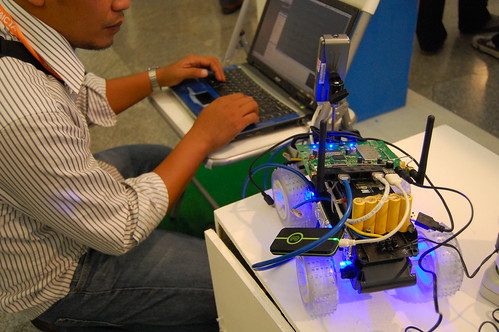Table of Contents
Introduction
In today’s fast-paced world, the demand for skilled professionals in the field of mechatronics is on the rise. Mechatronics engineers play a crucial role in integrating mechanical, electronic, and computer engineering principles to design and develop innovative products and systems. If you have a passion for robotics, automation, and cutting-edge technology, becoming a mechatronics engineer could be the perfect career choice for you. In this article, we will guide you through the steps to become a successful mechatronics engineer in India.
Understanding Mechatronics Engineering
Mechatronics is an interdisciplinary field that brings together mechanical engineering, electronics, and computer science to design and create intelligent systems. These systems can range from consumer electronics to advanced industrial robots. As a mechatronics engineer, you will be involved in designing, testing, and manufacturing cutting-edge products that integrate mechanical components with sensors, microcontrollers, and software.
Educational Requirements
Pursue a Bachelor’s Degree
The first step towards becoming a mechatronics engineer is to obtain a bachelor’s degree in mechatronics engineering or a related field. Several reputed Indian universities offer undergraduate programs in mechatronics. During the course, students will gain a strong foundation in mechanical engineering principles, electronics, and programming.
Consider a Master’s Degree
While a bachelor’s degree is sufficient to start a career in mechatronics, pursuing a master’s degree can provide you with a competitive edge in the job market. A postgraduate degree allows you to specialize in areas such as robotics, control systems, or automation.
Optional: Pursue a Ph.D.
For those interested in research or academia, pursuing a Ph.D. in mechatronics engineering can open up opportunities to work on advanced projects and contribute to the field’s development.
Gaining Relevant Skills and Knowledge
To excel as a mechatronics engineer, you need to acquire a diverse set of skills.
Study Mechanical Engineering
Mechanical engineering forms the foundation of mechatronics. Understanding mechanical principles, such as kinematics and dynamics, is crucial for designing efficient and reliable mechanical systems.
Learn Electronics and Electrical Engineering
A solid grasp of electronics and electrical engineering is essential for designing and troubleshooting electronic circuits and systems used in mechatronic devices.
Master Computer Science and Programming
Programming skills are vital to control and automate mechatronic systems effectively. Familiarize yourself with programming languages such as C++, Python, and MATLAB.
Enrolling in Specialized Courses and Training
To enhance your expertise in specific areas of mechatronics, consider enrolling in specialized courses and training programs.
Robotics and Automation Courses
Robotics and automation courses offer insights into designing and programming robotic systems, which are integral to mechatronics.
Control Systems Training
Control systems training equips you with the knowledge to design and implement control algorithms for automated systems.
Embedded Systems Learning
Embedded systems training helps you understand the integration of software and hardware for efficient system functioning.
Internships and Industrial Exposure
To gain practical experience, seek internships and industrial exposure during your academic years. Internships provide valuable insights into real-world applications of mechatronics.
Building Projects and Portfolios
Building projects and maintaining a portfolio showcases your practical skills to potential employers. Develop innovative projects that demonstrate your proficiency in mechatronics.
Joining Professional Associations
Joining professional associations, such as the Institution of Engineers (India), can provide networking opportunities and access to industry events and resources.
Job Search and Application
Prepare a Strong Resume
Craft a well-structured resume highlighting your academic achievements, skills, projects, and any relevant work experience.
Ace the Interview
During interviews, emphasize your passion for mechatronics and showcase your problem-solving abilities.
Be Open to Internship Opportunities
Starting your career with an internship can pave the way for permanent positions in reputed companies.
Career Prospects in India
The demand for mechatronics engineers in India is growing steadily. Opportunities exist in various industries, including manufacturing, automotive, aerospace, and robotics.
Conclusion
Becoming a mechatronics engineer in India requires a combination of education, skills, and practical experience. By following the outlined steps and continuously expanding your knowledge, you can build a successful career in this exciting field.
FAQs
1. What is mechatronics engineering?
Mechatronics engineering is an interdisciplinary field that combines mechanical, electronic, and computer engineering principles to design intelligent systems.
2. Is mechatronics engineering in demand in India?
A- Yes, mechatronics engineering is in high demand in India, given the country’s growing focus on automation and robotics.
3. What skills are essential for a mechatronics engineer?
A- Essential skills for a mechatronics engineer include mechanical engineering, electronics, programming, and problem-solving.
4. How long does it take to become a mechatronics engineer?
A- It typically takes four years to complete a bachelor’s degree in mechatronics engineering. Pursuing a master’s or Ph.D. may take additional years.
5. Can I specialize in a particular area within mechatronics?
A- Yes, mechatronics offers various specializations, such as robotics, control systems, and automation, allowing you to focus on your area of interest.




